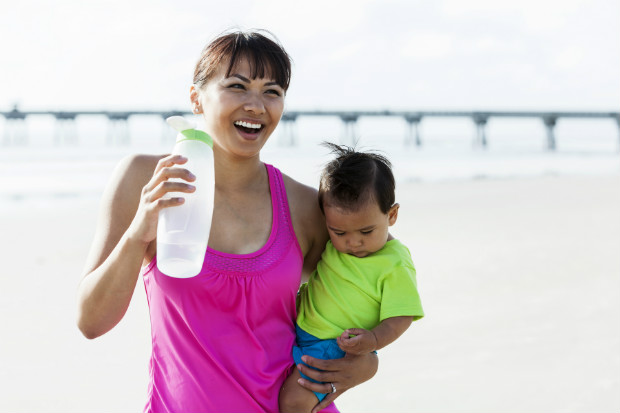
As a busy parent, it’s easy to overlook your own needs as you focus on the needs of your family. But are you aware that dehydration can quickly slow you down, drain your energy and impair your ability to function at peak performance?
Parents simply can’t afford to be operating at anything less than their best.
Consider the research: According to studies at the University of Connecticut’s Human Performance Laboratory, even mild dehydration can alter a person’s mood, energy level and ability to think clearly.1 It’s been estimated that up to 80% of adults are at least mildly dehydrated as they go through their day.2
While various beverages and foods provide fluids, there’s good reason to drink water. Water has no calories or caffeine, no sugar, artificial flavors or colors. It helps you regulate your body temperature, aids in digestion and helps your body flush out toxins.
For pregnant women, water carries nutrients to your body and to the growing baby. It carries away waste products from you and your baby, and helps to keep you cool and control swelling. Water can also help prevent premature contractions.
On the Go & At Home
All of these benefits point to the fact that drinking water is a must. But for active parents, hydration isn’t always top of mind. Here are some tips to help increase your water intake during the day:
• On the go, carry a water container with you and sip throughout the day. Many strollers have drink cups built in for convenience. Fill ’er up!
• At home, start the day by putting a pitcher of fresh water in the ’fridge and drink a glassful with meals and snacks.
• To add flavor, squeeze some fresh lemon or lime juice into your water glass, or add frozen fruit slices such as kiwi or orange to your pitcher.
• For an herbal flair, add a sprig of mint, basil or dill to your water, or make an herbal infusion or brew herbal tea.
• Consume high-water-content foods like lettuce, grapefruit, watermelon and milk.
If you’re concerned about water quality, buy bottled water, install a water filter or boil water before drinking.
While Exercising
It’s especially important to drink water while exercising — which includes pushing a stroller on a walk or run, taking the kids on a hike or spending family time splashing in the pool. While experts are hesitant to offer strict guidelines on quantities, most agree that drinking before, during and after exercise is a must.
The Dieticians of Canada organization recommends drinking 250 ml to 500 ml of water four hours before exercise, and 125 ml to 375 ml two hours before exercise. The organization suggests sipping water during your activity, then drinking water after exercise to quench your thirst and replace lost fluids.3
For the Family
Of course, it’s also important to keep your children hydrated during the day. As with adults, this requires a little planning, but building good hydration practices early will keep your children in the habit of staying well hydrated as they grow.
Let your toddlers or older children pick out their own favourite water containers and fill them up. For infants, breast milk or formula is the only food and drink your baby needs for the first six months.4 If you choose formula, be sure to mix the formula* with a trusted source of water like Nursery® water. Nursery® water is also a good choice for mixing cereal and diluting juices, or for drinking out of a cup.**
And don’t forget to increase your family’s hydration in warmer weather.
To stay at your peak, drink plenty of fluids every day — and count on water as the clear choice for healthy hydration.
1 “Even Mild Dehydration Can Alter Mood,” Colin Poitras, UConn Today, University of Connecticut, https://today.uconn.edu/2012/02/even-mild-dehydration-can-alter-mood/, February 12, 2012.
2 “Avoid Dehydration in the Workplace,” Industrial Safety & Hydration News, October 12 2009.
3 Dieticians of Canada, “Sports Hydration — Get the Facts,” https://www.dietitians.ca/Your-Health/Nutrition-A-Z/Sports-Nutrition-(Adult)/Sports-Hydration.aspx
4 Public Health Agency of Canada, “Breastfeeding & Infant Nutrition,” https://www.canada.ca/en/public-health/services/health-promotion/childhood-adolescence/stages-childhood/infancy-birth-two-years/breastfeeding-infant-nutrition.html#s2
* Nursery® water is not sterile. Use Nursery water as directed by a physician and follow the use instructions found on the infant formula product label. When using Nursery water follow good hygiene practices to preserve its quality. When using Nursery water in preparing infant formula or cereal, first add Nursery water to the bottle or bowl, replace the bottle cap, and then add powdered formula or cereal. After opening, refrigerate and use within 7 days.
** Consult your pediatrician regarding when and what amount of water your baby should drink.
 |
Brought to you by Nursery Water. |






